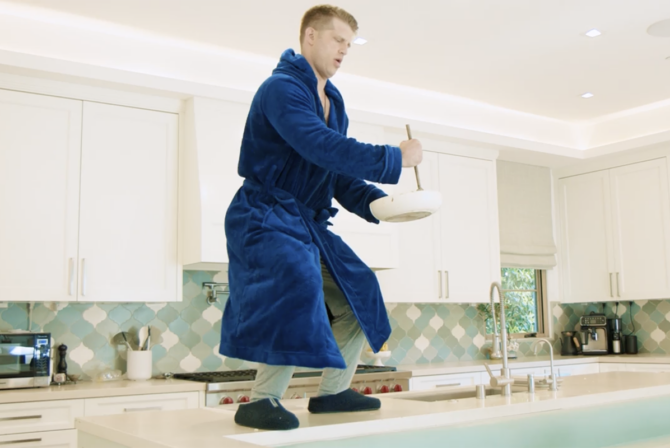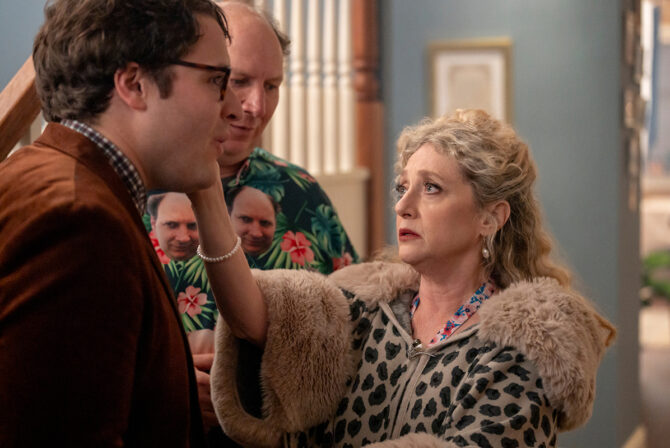An Israeli film, “The Kindergarten Teacher,” is playing in the U.S. just in time for American kids to head back to school after their Jewish holiday breaks (but before the Columbus Day break).
The titular kindergarten teacher, an aspiring poet and mother, becomes convinced that one of her 5-year-old students is a poetic genius. She resolves to both nurture his Mozart-like talent and protect him from a “fascist” society that she asserts hates and is afraid of “poets who think,” as well as from the boy’s nanny, a wannabe actress, who passes off his poems as her own for auditions, and a father who runs a successful, upscale restaurant and is more concerned with material success.
READ: I Missed a Major Career Milestone, But At Least I Was With My Kids
To me, the movie was an obvious example of how those of us with experience, be it teachers or veteran parents, can easily fall into the trap of thinking we know what’s best for other people’s children. See that young mother over there, the one not breastfeeding/introducing solid food too early/not reading to her child/not disciplining them properly/letting them play with her iPhone for hours/not dressing them warmly enough/cursing in front of them/homeschooling (really the list is infinite)…. She obviously doesn’t know what she’s doing. She’s damaging that child, possibly irrevocably. I could do a much better job. I could save them.
I doubt it’s a coincidence that, at one point in the movie, the teacher leads her charges in a rousing chorus of “Mi Yimalel” (“Who Can Retell?”), a song honoring the heroes of the Hanukkah story, looking right at her little prodigy as she sings of being the hero who comes to his aid.
Later, the teacher stops in the middle of having sex with her husband (fun fact: Israeli movies are apparently much more easy-going about showing male frontal nudity in a completely matter-of-fact manner, while keeping the woman covered up; it made for a pleasant change of pace), to answer her phone and write down her student’s latest poem. She then passes his work off as her own, leading to a second sexual encounter, this time with her impressed poetry teacher (more matter of fact male frontal nudity; my husband asked if it was the movie’s way of showing us they were all circumcised).
The obvious implication is that she is working out her sexual frustrations via the boy (which probably explains another, vaguely creepy scene where she takes him into the school’s shower and soaps him down; something else that wouldn’t happen in an American movie, much less an American school). But I saw a different sort of frustration.
In the middle of the story, seemingly apropos to nothing, the teacher’s son announces that he will be re-enlisting in the army so that he can become an officer. At a party celebrating his promotion, his friend raises a toast to the parents, “for making him into a soldier.” The teacher smiles politely and accepts the applause, even though, earlier, she and her husband agreed that an army career is, “only for morons and poor people.”
READ: The Upside to My Daughter’s Growing Independence
Clearly, she would much rather her own son become a poet.
Which brings up the second point that hit home with me. Not only do we think we know what’s best for other people’s children, but also our own.
When the teacher goes to speak to the little boy’s father about nurturing his son’s gifts, the dad invokes his brother, a one-time poet who now works at a struggling newspaper, and snaps, “I won’t encourage [my son’s] tendencies. I want him to have a normal life… I can’t stand bitter people, whiners and losers who can’t see where the world is going.”
Harsh words. But I get it. Because I feel exactly the same way.
I’ve made my living as a writer for 20 years. I’ve had a dozen books published, including two New York Times bestsellers. I am still writing books. But I have also seen advances shrink into slave wages (by my count, I make about $.35 cents an hour per book), magazines I used to contribute to regularly close, and short story per-word payments stagnate at the same levels once paid to F. Scott Fitzgerald… in the 1920s.
My oldest son is an excellent writer. He has piercing insights into people and their motivations, a unique voice, and a quirky style. You have no idea how happy I felt when he told me, “I may be good at writing, but I hate it.”
My middle child also hates writing. And he isn’t particularly good at it, either. You have no idea how happy I felt when he showed no interest in it whatsoever, instead gravitating towards math and science. When he was 8 years old, he discovered computer programming. And he turned out to be quite good at it. Prodigiously good. As in winning prizes in coding contests for high school and even college students good.
READ: My Sons Grow Farther Apart Every Day
I admit it. I went a little nutty. Not only was my son interested in a field that had career potential (like the dad in “The Kindergarten Teacher,” I can see where the world is going), but he had an actual talent for it!
Surely, we must be doing more to nurture this! Should we sign him up for advanced work (at school, the teacher has him teaching half the class, so he isn’t learning much)? Maybe a college course? Or a private tutor?
It was my husband, a teacher, technology expert, and a one-time prodigy himself, who talked me down. He explained that the programming our son was doing now was creative precisely because he’d taught himself. He didn’t know the “right” answer to the problems he was tackling, which is why he was able to come up with his impressive, original solutions. The best thing I could do for him was to leave him alone and let him do his own thing at his own pace.
It hasn’t been easy. But I am working on it.
Seeing “The Kindergarten Teacher” helped a lot.







